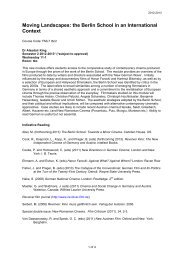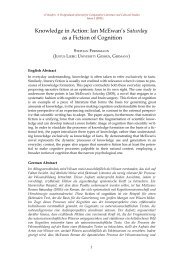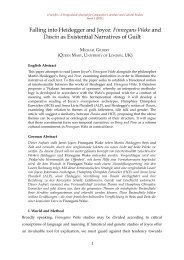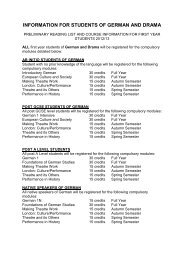Student Handbook - The School of Language, Linguistics and Film
Student Handbook - The School of Language, Linguistics and Film
Student Handbook - The School of Language, Linguistics and Film
You also want an ePaper? Increase the reach of your titles
YUMPU automatically turns print PDFs into web optimized ePapers that Google loves.
Writing essays<br />
<strong>The</strong> <strong>School</strong> is active in the College’s ‘Writing in the Disciplines’ programme, <strong>and</strong> some <strong>of</strong> its<br />
modules are designed to be writing intensive, that is, to provide serious instruction on essaywriting<br />
as an integral part <strong>of</strong> the module; you are encouraged to take at least one <strong>of</strong> these<br />
modules during your studies here. Essays are the main type <strong>of</strong> work that you will be<br />
producing throughout your undergraduate career. It is essential that you develop the skills <strong>of</strong><br />
writing essays <strong>of</strong> university st<strong>and</strong>ard as quickly as possible. <strong>The</strong> process is not an instant<br />
one, <strong>and</strong> students come to university with different skills <strong>and</strong> approaches; moreover,<br />
lecturers have different ideas about essay writing as well. <strong>The</strong> following notes are intended<br />
as general help <strong>and</strong> orientation. <strong>The</strong>y should be treated as ancillary to the guidance <strong>and</strong><br />
feedback that you will get from your teachers throughout your studies in the <strong>School</strong>. <strong>The</strong><br />
English <strong>Language</strong> <strong>and</strong> Study Skills section <strong>of</strong> the <strong>Language</strong> Centre (Room 1.24 on the first<br />
floor <strong>of</strong> the Bancr<strong>of</strong>t Building) <strong>of</strong>fers a number <strong>of</strong> free courses on academic writing, which<br />
you may find useful if you wish to improve your writing skills.<br />
<strong>The</strong> purpose <strong>of</strong> essay-writing<br />
Perhaps the first point you should be aware <strong>of</strong> is that at university level literature, linguistics,<br />
film, <strong>and</strong> cultural studies are not disciplines which look for black-<strong>and</strong>-white, ‘right’ or ‘wrong’<br />
answers to problems. It is accepted that problems will produce many interpretations, <strong>and</strong><br />
disputes among experts are a sign <strong>of</strong> a healthy interest in the subject.<br />
Essay-writing requires you to organise your thoughts on a given topic, <strong>and</strong> to put forward<br />
your own argument in response to a particular question. It also gives you valuable<br />
experience in expressing your ideas in a clear, logical <strong>and</strong> structured way —a skill which<br />
obviously has countless applications beyond undergraduate studies.<br />
A further benefit from writing essays is that practice is gained which can be drawn upon in<br />
examinations, <strong>and</strong> the essays you write during term-time can be very useful revision aids<br />
(although, obviously, you may not answer on the same topic in an exam as you have<br />
already written for assessed coursework). Moreover, it is through the comments you receive<br />
on your essay (either written or oral) that you can gauge your own progress, discovering<br />
which areas are your particular strengths, <strong>and</strong> ones to which you may need to give more<br />
attention.<br />
Analysing the question<br />
Essays are written as responses to specific questions, rather than just general discussions<br />
<strong>of</strong> a topic. This is quite different from the system in many countries <strong>of</strong> continental Europe.<br />
Both in coursework essays <strong>and</strong> in examinations, relevance to the question is one <strong>of</strong> the<br />
most important criteria on which essays are judged.<br />
<strong>The</strong> first <strong>and</strong> most crucial step before embarking on writing, therefore, is careful thought<br />
about the question <strong>and</strong> analysis <strong>of</strong> it. What are you being asked to do? Essay questions<br />
can be <strong>of</strong> different types. Some are survey questions (‘Discuss the role <strong>of</strong> women in the<br />
Spanish Golden Age plays you have studied’); some focus on change over a period <strong>of</strong> time<br />
<strong>and</strong> ask you to assess questions <strong>of</strong> causation (‘Account for the development <strong>of</strong> the passive<br />
in French’); some invite you to engage in a debate on an issue which has generated critical<br />
controversy <strong>and</strong> on which you are expected to come down on one side or other (‘Do you<br />
agree that classicism is an outmoded concept?’); some may ask you to concentrate on<br />
aspects <strong>of</strong> form (‘Discuss the use <strong>of</strong> colour in the films <strong>of</strong> Claude Chabrol’); <strong>and</strong> many<br />
expect you to combine these approaches.<br />
It is essential, therefore, before beginning to write, to clarify in your mind what the question<br />
is asking. Make absolutely sure that you underst<strong>and</strong> the question. If you do not, then ask<br />
your teacher, or choose another question.<br />
23







